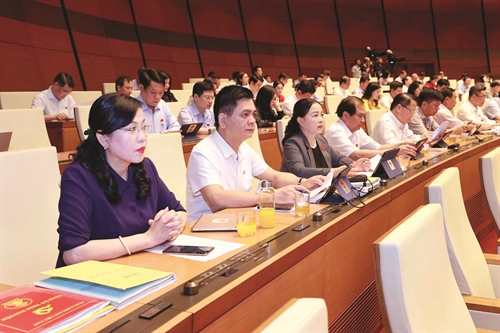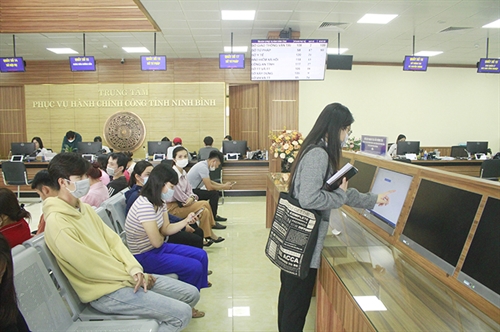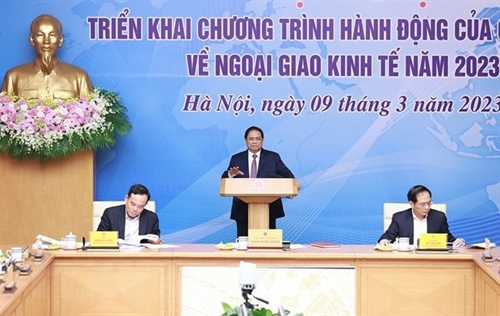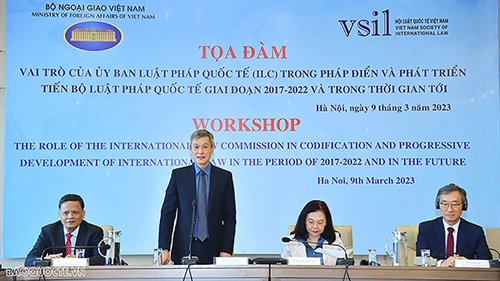 |
| Domestic and foreign journalists at the SEA Games 31 Media Press Center__Photo: Minh Dong/VNA |
In the digital era with numerous changes taking place, digital transformation is an inevitable trend for all press agencies. To help the media industry catch up with this trend, the Prime Minister on April 6 issued Decision 348/QD-TTg, approving the Strategy for digital transformation in media through 2025, with a vision toward 2030.
The Strategy says that digital transformation in journalism aims at building professional, humane and modern press agencies that are able to fulfill the mission of carrying out information and communications work to serve the Party’s revolutionary cause and the country’s renewal cause, while better meeting readers’ needs and promoting development of the digital content industry.
Application of converged newsroom model
The Strategy sets top goals to be achieved by 2030. Accordingly, all press agencies will apply the model of converged newsrooms and other models suitable to scientific and technological development in the world and produce contents following digital media trends. Also, all media firms will publish contents of their publications on digital platforms, with priority given to domestic digital platforms. Meanwhile, nine out of every 10 press agencies will use integrated data analysis and processing platforms and apply artificial intelligence (AI) to optimize their operations.
As per the specific targets set for 2025, 70 percent of press units will upload contents of their publications on digital platforms, half of them will use integrated data analysis and processing platforms and apply AI to optimize their operations, while 80 percent of them will operate the converged newsroom model suitable to the world’s scientific and technological development and produce contents in line with digital journalism trends.
In addition, all online press agencies will apply solutions to ensure information security at level 3 or higher.
To achieve the above goals, the Ministry of Information and Communications (MIC) released Decision 781/QD-BTTTT (Decision 781) just one month after the enactment of Decision 348, launching the plan of action for implementation of the Strategy.
The plan clarifies tasks, time for completion and implementation responsibilities of the Ministry’s agencies and units which must be performed right from 2023 and in subsequent years.
According to Mai Huong Giang, Deputy Director-General of the MIC’s Authority of Press, to make sure all the set targets are completed on time, Decision 781 sets out annual roadmaps from now until 2030. “For example, regarding the rate of contents of publications of media firms to be published on digital platforms, the Decision sets out the figures of 30 percent for 2023, 50 percent for 2024 and 70 percent for 2025,” Giang said, adding that in the subsequent period, implementation roadmaps will also be set out for each year from 2026 to 2030.
Development of digital media products and digital platforms
One of the major tasks and solutions put forward under the Strategy approved under Decision 348 is to develop digital media products. Specifically, new information product models will be designed and created on different platforms to increase reader engagement and ensure faster, wider and accurate distribution of information contents to meet readers’ needs, while scientific and technological advances will be applied to promote the process of automated content creation.
As for development of digital platforms, the Strategy introduces tools for data collection and processing, and journalism quality evaluation, forecasting, monitoring and supervision. It also establishes indicators for evaluation of the maturity of digital transformation in journalism. At the same time, the national digital (online) radio platform, national digital television platform and online media platform will be created and developed to help media agencies distribute journalistic contents and share journalistic data.
Worthy of note, press agencies with sufficient technological and financial potential will be encouraged to create their own platforms to meet the requirements of digital transformation.
The Strategy requires competent agencies to support press agencies in intensifying the application of information technology in management of operational activities through the use of online platforms for newsroom management in press agencies. Media firms will also be assisted in research, development and application of technologies for digital transformation through national-level key science and technology programs.
In light of the aforementioned tasks and solutions, the MIC is assigned to take charge of formulating specific plans and programs for implementation of the Strategy, and issue legal documents concerning the promotion of digital transformation in journalism within its competence or propose competent authorities to do so.
The MIC is also tasked to promote the formation and development of national digital platforms for journalism as well as digital platforms to support press agencies in carrying out digital transformation and developing digital media products. It will have to organize the preliminary review of implementation of the Strategy in 2025 and the final review in 2030 and propose modifications or supplementations to the Strategy when necessary.
To concretize the tasks and solutions mentioned above, the action issued together with Decision 781 states that for each group of tasks and solutions, responsible agencies will be assigned to act as in-charge units and coordinating units. The plan of action also specifies outcomes/products for different groups of solutions, criteria for evaluation, and time required for completion.
Specifically, concerning improvement of legal framework, the Authority of Press will have to prepare a draft law revising the Press Law, adding the policy on promotion of digital transformation in media, and formulate a set of indicators for evaluation of maturity of digital transformation in press agencies. Meanwhile the Department of Legal Affairs will review, and propose the revision of, relevant legal documents to support the process of digital transformation in journalism and clarify online advertising. For its part, the Authority of Foreign Information Service will study mechanisms and policies to encourage press agencies engaged in external information work to intensify cooperation with foreign media firms and distribution of contents on social network platforms. It will also take charge of formulating the set of criteria for evaluation of efficiency of foreign information services in the electronic environment.
With respect to human resource solutions, the assigned units under the MIC will have to hold training courses on digital transformation knowledge and skills, cyber security, new technologies in press agencies, and content production and distribution on digital platforms. They will also include contents on professional activities in digital journalism in training programs and study application of new technologies in press and communication activities.
As for development of digital platforms and digital media products, the Authority of Press will act as the in-charge body in most tasks and solutions. It will be responsible for proposing platforms for shared use, such as infrastructure platforms, converged newsroom platforms, and security and confidentiality assurance services serving digital transformation in journalism.
The Authority will also cooperate with organizations and businesses in providing press agencies with support in terms of technology, telecommunications and information security to promote digital transformation in media. At the same time, it will propose pilot application of digital technology platforms for surveillance and reporting on copyright infringements in the digital environment, aiming to protect press agencies undergoing digital transformation. Particularly, it will be responsible for establishing a center for supporting digital transformation in journalism.
It can be said that the Strategy will serve as an important basis for media agencies to speed up digital transformation. As evaluated by Deputy Prime Minister Tran Hong Ha, with the boom of information technology, online platforms and social networks, press agencies are facing fiercer competition than ever before and have no choice but to enter the playground. “Development of digital journalism products and production of multimedia information on multiple platforms and multiple devices are ways to diversify markets and revenue sources of media agencies”, he stressed.-









